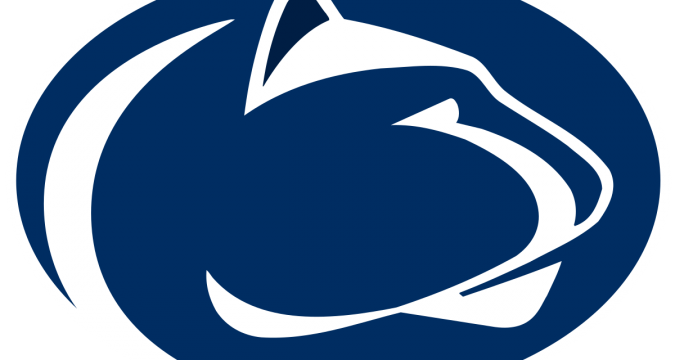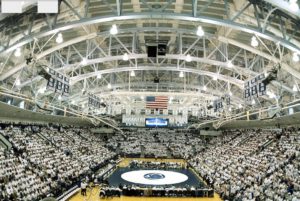
I had never stepped on the Penn State campus until my sophomore year— September 1950. My freshman year was spent at Edinboro as a Penn State student. Back then there were no freshmen on main campus. WW II had supplied a wave of ex-GI’s returning to Penn State, and there simply wasn’t enough room in State College. Penn State “farmed out” its incoming freshmen to various state teachers colleges (as they were known then) based on your academic major. Engineering and Mineral Industry majors were sent to Edinboro. The fraternities were an attractive social possibility, and I “rushed” and pledged Delta Upsilon—at that time a large white farmhouse occupying a lot as large as a whole city block on Locust Lane.
Several of the members were wrestlers, and the president of the house was Hub Axford, who was also the head manager of the wrestling team. Prior to that time I had never even seen a wrestling match. The “student manager” system at that time was unique. All major sports followed the same format. For wrestling, a notice was posted on campus for sophomores who were interested in becoming a manager for the team. Usually 15 to 20 male students (no female managers back then) applied and six–eight were chosen. After their sophomore season three sophomores were chosen to be “junior” managers by the head coach, team captain and previous upper class managers. After the junior season one of the three was selected to be the head manager for his senior year by head coach Charlie Speidel, team captain Don Maurey, and the previous year’s head manager, who was Chuck Schutte. The job of the head manager was essentially to provide all the services necessary to help the coach. Charlie would give almost free reign regarding how something was accomplished as long as it got accomplished.
My manager staff consisted of three junior managers and the six sophomores who did most of the “dirty work”: setting up and cleaning the mats each day, taking care of the workout gear-drying room, running clocks for matches, etc. When we went on a trip I would get several hundred dollars from Ike Gilbert in the Athletic Office to pay for trip expenses such as rooms, individual meals, the pre-match training meal and miscellaneous things like treats and magazines for the wrestlers. We also paid several drivers (usually out-of-season assistant coaches from other sports) to drive their cars on away trips since we had no “motor pool” back then. They were happy to get the $15 per day plus expenses. One of those drivers in 1953 was a young man named Joe Paterno.
Charlie Speidel was probably the biggest influence in my life at Penn State. Charlie and his wife never had children of their own, but Charlie had a family of 10–15 different young men each year that he coached. He was a father figure to us all and an amazing motivator, who was more of a leprechaun than the one who resides in Indiana. Charlie was at first a professional boxer who switched to wrestling when he confessed, “I found a sport where I could participate even if I was down on the floor.” The three years I spent with Charlie and his best friend, Alumni Association Director Ridge Riley, were some of the happiest years of my life. Ridge could never remember my name so I was always “Laddie.” Charlie could never remember anyone’s name so everyone was just “Doc.” Stories abound about Charlie’s antics over the years, and the ones I witnessed are too numerous to mention. I will only say that the more outlandish a story may sound, probably the more likely it was to be true.
The night we won the NCAA championship was understandably a night to remember. As head manager I was the announcer at all home meets and at the nationals in Rec Hall. After the semi-final round I had calculated that we had won the championship—regardless of what happened in the finals. I announced it to the fans and invited them back to the final session that night to crown Penn State the new champions. Ouch!!! Gen. Percy Sadler, a Lehigh grad and chairman of the NCAA Wrestling Committee, came rushing across the gym to chew me out for my brashness. Charlie came over to the table to find out why all the commotion. I sheepishly explained the situation to him with a red-faced Sadler still huffing and puffing. Charlie asked me, “Are you sure?” I replied, “Absolutely!” With that Charlie turned to Sadler and smiled. “So, what’s all the fuss?”, and he then turned and walked away. Sadler retreated to his seat with the tournament officials without another word.
After graduation I spent two years in the service and then returned to Penn State to earn a graduate degree and renewed my friendship with Charlie and Penn State wrestling. It has continued to this day. Living in the Lehigh Valley—a hot bed of high school wrestling—has made it much easier to maintain the contact. Over the years many local wrestlers have chosen Penn State and have become part of our extended family—such as Barry Snyder, Al Snellman, Johnnie Fritz, Tom Slowey, Ernie Schoenenberger, Bruce Balmat, Dickie De Walt, Dan Newhard, and Andy Voit—as well as all of the members of the team from other areas.
I was blessed to have married a young Penn State coed, Dawn, who has shared in my love of the sport and has welcomed members of the Penn State wrestling family into our home on innumerable occasions. She even spent several summers at wrestling camp so we could keep in touch with the program. In addition, each year there was a two-week gap between the EIWA tournament and the NCAAs. After he retired to Florida, Charlie Speidel would head north to spend the first week with Johnny Johnston at Princeton and then the second week with us, and I would take him to wherever the NCAAs were to be wrestled. The concept and the true worth of the Penn State wrestling family is never more evident than when one of the family passes on. As I have witnessed the loss of these members over the years—wrestlers, coaches, fans, parents, and even my own son—I have become more aware and more thankful for all of the true and lasting friendships that have evolved from that one small move that I made in 1950 when I filled out my application to become a wrestling manager at Penn State.

